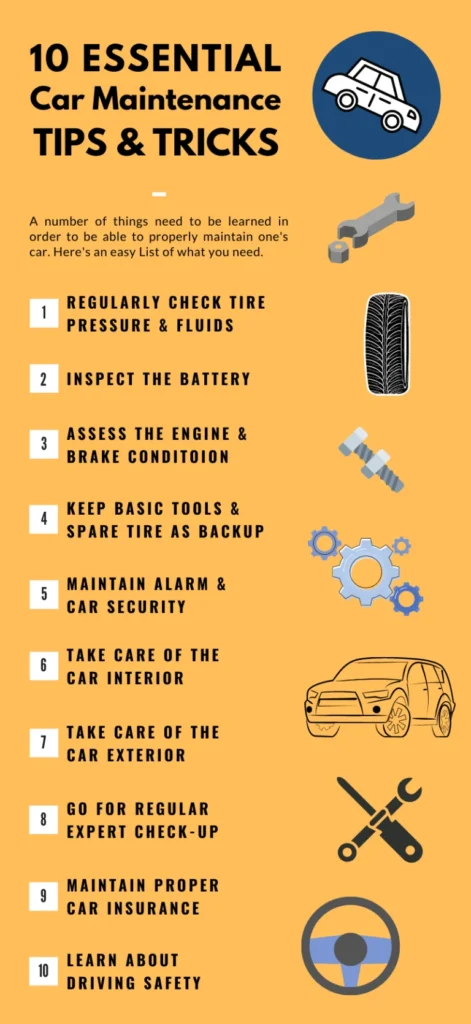Keeping your car properly maintained is essential for ensuring its longevity and performance. With the help of expert advice, you can learn the best practices for taking care of your vehicle. From regular oil changes to checking tire pressure, there are several essential car maintenance tips that every car owner should follow to keep their vehicle running smoothly and safely. By following these tips, you can avoid costly repairs and breakdowns, and also improve the overall efficiency of your car. Expert advice on essential car maintenance tips can help you become a more responsible car owner and ensure that your vehicle stays in top condition for years to come.
Car owners often wonder about the most effective ways to maintain their vehicles and keep them in good shape. Regular maintenance not only ensures safety and efficiency but also helps in preserving the value of your car. By following expert advice on essential car maintenance tips, you can save money in the long run by avoiding major repairs and breakdowns. Additionally, proper maintenance can also help in improving fuel efficiency and reducing emissions, contributing to a cleaner environment. With the right knowledge and guidance, car maintenance can be a simple and manageable task for any car owner.
1. Regular Oil Changes
One of the most important car maintenance tasks is to regularly change the oil. This helps to keep the engine running smoothly and prevents unnecessary wear and tear. The frequency of oil changes can vary depending on the make and model of your car, so it’s important to refer to the owner’s manual for specific guidelines. Typically, it’s recommended to change the oil every 3,000 to 5,000 miles, but newer cars with synthetic oil may be able to go longer between changes.
Ignoring regular oil changes can lead to engine damage and costly repairs down the road. It’s a relatively simple and inexpensive maintenance task that can greatly extend the life of your car, so it’s important not to overlook it.
2. Check and Replace Air Filters
Another essential car maintenance tip is to regularly check and replace the air filters. The engine air filter prevents dirt and debris from entering the engine, while the cabin air filter ensures that the air inside the car is clean and free of pollutants. Over time, these filters can become clogged and dirty, reducing their effectiveness.
Checking and replacing the air filters at regular intervals, typically every 12,000 to 15,000 miles, can improve engine performance, fuel efficiency, and air quality inside the car. It’s a simple task that can be done by following the instructions in the owner’s manual or seeking professional help if needed.
3. Tire Maintenance
Proper tire maintenance is crucial for both safety and performance. This includes regularly checking tire pressure, rotating the tires, and ensuring that they are properly aligned and balanced. Underinflated tires can lead to poor fuel efficiency and uneven tire wear, while overinflated tires can affect the car’s handling and braking.
It’s important to check the tire pressure at least once a month and before long road trips. Additionally, rotating the tires every 5,000 to 8,000 miles helps to ensure even wear and extends the life of the tires. Proper wheel alignment and balancing also play a key role in maintaining the overall health of the tires and should be checked regularly.
4. Brake Maintenance
Brake maintenance is essential for safe driving. Regularly checking the brake pads, rotors, and brake fluid can help to prevent brake failure and ensure optimal stopping power. The brake pads should be inspected for wear and replaced if they are too thin, while the brake fluid should be checked for proper levels and signs of contamination.
It’s important to address any brake issues immediately and have the brakes inspected by a professional if there are any signs of squeaking, grinding, or reduced responsiveness. Proper brake maintenance not only ensures safety on the road but also helps to prevent more costly repairs in the future.
5. Fluid Checks and Top-ups
Regularly checking and topping up essential fluids such as coolant, transmission fluid, power steering fluid, and windshield washer fluid is crucial for maintaining the overall health of the car. These fluids play a key role in ensuring proper functioning of various systems and components.
It’s important to follow the manufacturer’s recommendations for fluid intervals and to address any leaks or low fluid levels promptly. Neglecting fluid maintenance can lead to overheating, poor performance, and potential damage to the car’s systems.
6. Battery Maintenance
Proper battery maintenance is important for ensuring reliable starting power and electrical system performance. This includes regularly checking the battery terminals for corrosion, ensuring a secure connection, and testing the battery’s charge level.
It’s important to clean any corrosion from the terminals and to replace the battery if it’s old or showing signs of weakness. Additionally, it’s a good idea to have the charging system and battery tested regularly, especially before long trips or during extreme weather conditions.
7. Regular Inspections and Tune-ups
Regular inspections and tune-ups by a qualified mechanic are essential for identifying and addressing potential issues before they turn into major problems. These inspections can include checking the suspension, steering, exhaust system, and other vital components of the car.
Additionally, scheduling regular tune-ups can help to ensure that the engine is running efficiently and that any necessary adjustments or replacements are made to maintain peak performance. Following the manufacturer’s recommended maintenance schedule is key to keeping the car in top condition.
8. Keeping It Clean
While it may not seem like a maintenance task, keeping the car clean inside and out is important for preserving its condition and value. Regular washing and waxing help to protect the paint and body from corrosion and damage, while cleaning the interior prevents dirt and grime from causing premature wear and tear.
It’s also important to address any chips or scratches in the paint promptly to prevent rust from forming. Taking pride in the appearance of your car not only makes it more enjoyable to drive but also helps to maintain its overall condition for years to come.



